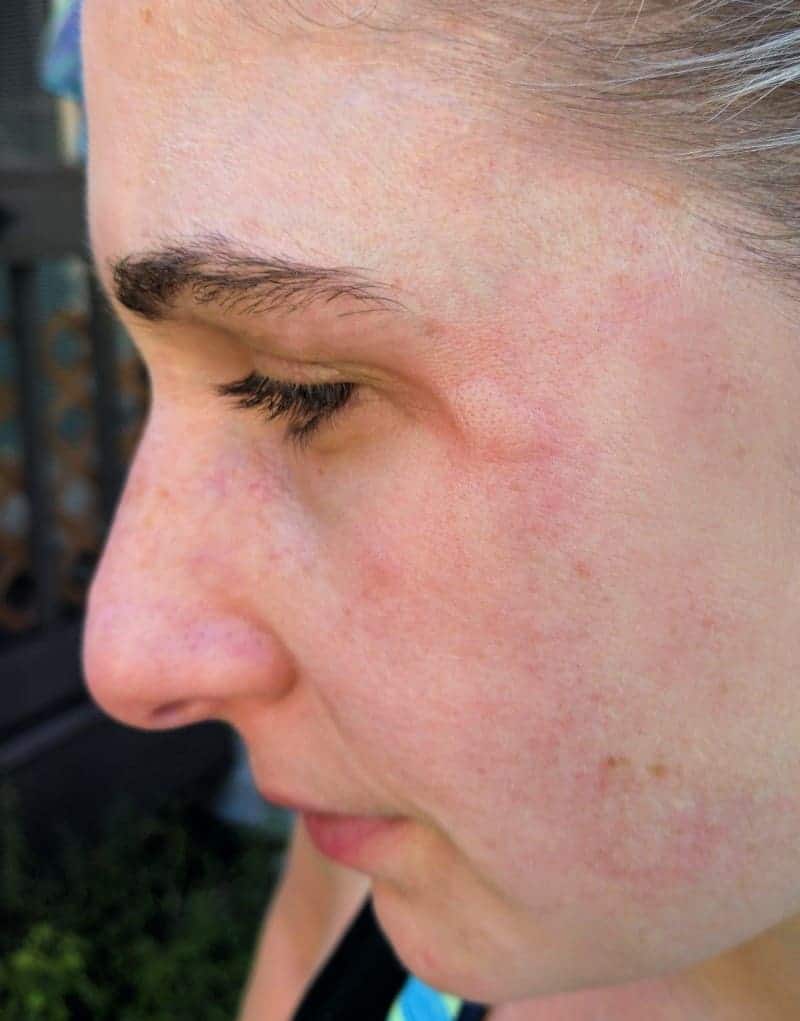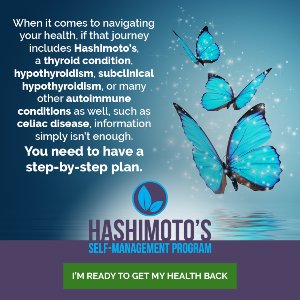Hashimoto's flare-up symptoms can be subtle or very obvious. Flares can happen at any time and sometimes seemingly sneak up out of nowhere. You could be going through your normal daily life and routine and suddenly feel emotionally and physically "bulldozed" for a period of time without warning.
If you're wondering if your symptoms are part of a flare, this post is for you. I'll also get into the science behind the symptoms, common triggers, prevention, and more.
If you're looking for the best way to manage a flare, check out my post on How to Calm a Hashimoto's Flare.
WHAT IS A HASHIMOTO'S FLARE?
A Hashimoto's flare is a short-term worsening of typical symptoms seen in thyroid disease where your overall physical and mental state are more severely impacted for a period of time.
People with Hashimoto's Thyroiditis and Grave's Disease have sensitive immune systems and are fairly reactive to external triggers. Thus small changes in things like diet, activity level, allergen exposures, and other things can cause an immune response that leads to a flare. We'll get more into triggers a little later.
WHAT ARE HASHIMOTO'S FLARE-UP SYMPTOMS?
There are a lot of physical and psychological manifestations of hypothyroidism, some of which you may or may not have realized were even thyroid-related.
Some of the symptoms listed below are more common than others. However, I wanted to be as thorough as possible, so I've listed every symptom I could find. If I found it being mentioned in connection with an underactive thyroid and/or thyroid flares, it's included here.
**Just a quick heads up- this post contains affiliate links which means if you click on them and buy something, I will earn a small commission (at no additional cost to you) to help continue maintaining this site.
Note to readers: This site does not provide medical advice. It is intended for informational purposes only. It is not a substitute for professional medical advice, diagnosis or treatment. Consult your doctor before making any medical decisions.
FLARE-UP SYMPTOMS CAN INCLUDE:
1. SUDDEN OR WORSENING FATIGUE
This could be described as feeling more run down and exhausted than usual, feeling "heavy" and having difficulty getting out of bed and moving throughout the day.
I've heard someone describe it as feeling like she'd been "hit by a truck." You may sleep 12 hours at night but still feel like you could sleep all day.
There are probably quite a few elements that go into the "why" and what causes it. Fluctuations in thyroid hormone levels, adrenal fatigue, and decreased cortisol production are the most obvious factors likely at play.
Some issues with fatigue can be caused by blood sugar issues as well.
2. BRAIN FOG, MEMORY LOSS, AND DIFFICULTY CONCENTRATING

Photo by Andrea Piacquadio from Pexels
Increased forgetfulness, difficulty concentrating, and memory issues are common symptoms in thyroid disorders and even more common during a flare.
You might find yourself walking into a room for something or open the fridge and then wondering what you were going to get. You may suddenly forget your pin or password that you use every day or momentarily forget the name of someone you know well. I've had these experiences more than I'd like to admit. It's frustrating and sometimes embarrassing!
3. ACHES AND PAINS
You may feel like you're coming down with the flu due to general achiness, tenderness, and stiffness in your muscles and joints. This can affect any part of your body from your shoulders, back, neck, and hips to your hands, fingers, ankles, and feet.
Inflammation and swelling during a flare can lead to pressure on nerves causing pain. [1] Carpal tunnel syndrome is one example of this; it's common with hypothyroidism as discussed here.
One possible reason for this, according to a study published in the Journal of Clinical and Diagnostic Research, is "attributed to the deposition of mucinous material or mucopolysaccharides on the median nerve " and "swelling of the synovial membrane around the tendons in carpal tunnel" [2]. Your carpal tunnel syndrome symptoms may worsen during a flare. This often comes along with numbness and tingling in the hands and arms.
Both hypothyroidism and hyperthyroidism are known to be responsible for causing "myopathies" which means they affect your muscle tissue resulting in muscle cramps, stiffness, and spasms. They're caused by inflammation and metabolic disturbances that come along with autoimmune thyroid disease.
Back Pain
According to this review, there seems to be an association between degenerative disc disease and autoimmune thyroid disease which could be a cause of back pain. [3] It could also be attributed to adrenal fatigue or "myopathies" as discussed above.
Neck Pain
Hypothyroidism can cause neck pain for different reasons. It can cause pain in the back of your neck in the same way it causes aches and pains in other parts of the body (discussed above).
It can also cause pain in the front of your neck because, of course, your thyroid is there. If your thyroid becomes swollen during a flare, it will likely be sore.
There is another type of thyroiditis called subacute thyroiditis that is caused by a viral infection like the flu which causes the thyroid to become inflamed and tender but this is fairly rare and really rare to happen alongside Hashimoto's, however, I did find a case where this has happened and required treatment. [4]
4. GI ISSUES: CONSTIPATION, DIARRHEA, GAS, BLOATING, INDIGESTION
Hashimoto's and gut health issues are closely interrelated. Thus, if you're experiencing a flare, you may notice some annoying GI disturbances.
Hypothyroidism causes a slower transit of food through your digestive system which can lead to indigestion, acid reflux/heartburn, bloating, gas, constipation, and nausea.
Nausea and vomiting seem to be more commonly caused by hyperthyroidism rather than hypo but it's undeniably an occurrence in Hashimoto's flares. I hear about it often enough (nausea especially) and experience it frequently myself. It could possibly be blood sugar-related or GI distress/indigestion-related as well.
Nausea and vomiting can also happen with something called thyrotoxicosis- this happens in hyperthyroidism/Grave's where a very excessive amount of thyroid hormones are released into the bloodstream (or occasionally when someone with hypothyroidism takes too much of their prescribed thyroid medications) but this is a very rare occurrence.
Generally speaking, leaky gut and intestinal permeability are closely tied to autoimmunity and are believed to be a cause. Healing the gut will with an anti-inflammatory diet (something like the autoimmune Paleo diet) will likely help in reducing symptoms.
5. ANXIETY, HEART PALPITATIONS, AND PANIC ATTACKS
Panic attacks, anxiety, and heart palpitations are more commonly seen in hyperthyroidism/Grave's disease but have been reported quite a bit in hypothyroidism too.
It is possible to flip between hypothyroidism and hyperthyroidism and experience these symptoms with Hashimoto's. Fluctuation in thyroid hormones and adrenal issues are likely to blame for this. Sometimes anxiety can be tied to blood sugar issues as well.
In addition to the anxiety, heart palpitations, and/or panic attacks you may find that you're feeling less social and maybe isolating yourself more than you normally would. You may even be fearful of leaving the house, where normally it wouldn't be an issue.
In this study, published in the American Journal of Psychiatry, researchers interviewed 144 psychiatric patients and found that those with a history of panic disorder or agoraphobia were more likely than other patients to report a history of hyperthyroidism or goiter. Depression was also commonly reported among this group.[5]
Reviews like this one also were able to show a clear link between autoimmune thyroiditis (whether Hashimoto's or Graves) and anxiety. [6]
The mention of "social phobia" in some of these studies and several articles I've seen is interesting to me because I've noticed this in myself though I'm historically a very social person. I had just never connected it with my Hashimoto's.
Isabella Wentz, the Thyroid Pharmacist, has a good article on dealing with anxiety.

Photo by Sofia Garza from Pexels
6. DEPRESSION/MOOD SWINGS/APATHY/FEELING UNMOTIVATED
The causes behind depression and feelings of apathy during a flare tie into the same causes behind anxiety and panic attacks. The answer: hormones.
Neuroinflammation is also said to be the reason why people with Hashimoto's struggle with depression and other mood disorders.
Hypothyroidism itself is considered an inflammatory condition where higher levels of cytokines like C-reactive protein (CRP), interleukin-6 (IL-6), and tumor necrosis factor-alpha (TNF-α) are seen. [7]
Higher levels of inflammatory cytokines are also associated with depression. You can read more about it in this study.
7. INSOMNIA/ NOT SLEEPING WELL
Considering that hypothyroidism affects a gland that regulates so many bodily processes, it makes sense that your sleep may be disturbed. This can take the form of night sweats, sleep apnea, anxiety, etc.
You may feel like you're tired all day and then can't sleep at night. You may even find yourself running around the house doing a bunch of cleaning or other random tasks late at night when you would normally be asleep.
This can happen during a flare (or become exacerbated during a flare) and once again, thyroid hormone fluctuations and adrenal-related issues are the most common culprits.
Trouble sleeping is common in both hyperthyroidism and hypothyroidism.
Switching between hypo and hyper is fairly common which means someone with Hashimoto's can feel jittery or wired at bedtime making it hard to sleep.
Thyroid medication can also affect sleep- this would of course be something to ask your healthcare provider about.
8. DIZZINESS/SHAKINESS/BLOOD SUGAR DIPS
Blood sugar imbalances are common with autoimmune thyroiditis and in particular low blood sugar is seen fairly often in the early stages of Hashimoto's.
According to this study, thyroid disorders (hyperthyroidism or hypothyroidism) may contribute to the development of type 2 diabetes because the thyroid regulates carbohydrate metabolism. [8] They were able to find a strong correlation between having a thyroid disorder and also developing diabetes.
Izabella Wentz (The Thyroid Pharmacist) goes in-depth on blood sugar imbalances and Hashimoto's as well as what to do about it here.
9. INTOLERANCE TO HEAT AND COLD
Cold intolerance is more common in hypothyroidism than heat intolerance but either one can happen with a thyroid disorder. Since Hashimoto's patients sometimes alternate between symptoms of hyperthyroidism and hypothyroidism, they tend to struggle with regulating body temperature. You may find yourself having hot flashes in the middle of winter or needing to bundle up to keep warm on a nice day.

10. HEADACHES/MIGRAINES
You may notice you're suddenly getting headaches when you normally don't or getting worse headaches than usual.
The link between thyroid disorders and headaches isn't clear but studies like this one have found that people with a history of migraines have a 41% higher risk for developing hypothyroidism and people with a history of headaches have a 21% higher chance of developing it. [9]
I have heard women say their headaches also get worse during their periods which makes sense since hormone fluctuations tend to influence our symptoms and their severity.
11. HAIR LOSS
This is a common hypothyroidism symptom and can be hair from your head or anywhere else on your body.
Eyebrow hair loss and thinning are commonly reported issues. As Dr. K explains here, the most common cause of hair loss in people with Hashimoto's is an increase in testosterone. This can cause hair thinning, hair loss, and in some cases, facial hair growth.
In addition, when inflammation is high, thyroid hormones are not able to properly act on the cellular receptors in our hair follicles leading to hair growth/loss issues.
12. SKIN PROBLEMS
Thyroid flares can cause dryness, breakouts, and other skin issues like rashes, acne, itchiness, rosacea, eczema, and psoriasis simply because the thyroid is so closely tied to so many bodily systems and heavily influences hormones.
This study dives deeper into acne and other skin issues in relation to thyroid disease.
Skin rashes and hives or wheals, also known as uticaria, can appear as raised itchy bumps or welts. They can be caused by a lot of different things including foods, medications, and stress but they are common in thyroid disorders. [10]
One study found a higher occurrence of chronic urticaria (hives lasting at least 6 weeks) in patients with both anti-Tg and anti-TPO antibodies showing a strong association between chronic uticaria and thyroid autoimmunity. [10]
This study put it this way: "In patients with chronic urticaria, about 25%-30% of cases, antithyroid peroxidase (TPO) was detected and Hashimoto's disease was diagnosed." [11]

Dry flaky skin is a common symptom of hypothyroidism and can worsen during a flare. Thyroid hormones are very important in regulating skin cell health. Eccrine glands, which are sweat glands found all over the body, help to control the moisture of your skin. When thyroid hormones dwindle, eccrine gland secretion diminishes resulting in dry skin.
13. PUFFY FACE, SWOLLEN HANDS, AND FEET
Puffiness in the face, arms, legs, feet, and hands can be caused by both hypothyroidism and hyperthyroidism and can certainly happen (or worsen) during a flare.
As this case study shows, one woman had increased facial swelling when her thyroid antibodies increased. [12]
An interesting case report published in the Netherland's Journal of Medicine, shows pictures of a woman with Hashimoto's and facial swelling here where it provides this explanation for the puffiness:
"Hypothyroidism causes an increased deposition of glycosaminoglycans, especially hyaluronic acid, in the dermis. The increased deposition causes mucinous oedema which is responsible for the thickened features and a puffy appearance. The main cause of the depositions of glycosaminoglycans is local expression of the TSH receptor." [13,14] This phenomenon is referred to as myxoedema and can also affect the hands and feet.
14. BLURRED VISION OR BULGING EYES
Bulging eyes is a common symptom of Graves' disease/hyperthyroidism but can be seen in Hashimoto's/hypothyroidism too. Chronic or acute inflammation and other immune events can affect the muscle and tissue surrounding the eyes causing them to bulge.
Thyroid Eye disease (TED) is an eye condition where the eye muscles, eyelids, tear glands, and tissues behind the eyes become inflamed causing dryness, redness, and swelling which can push the eyes forward and result in "bulging eyes."
Sometimes the swelling or stiffness in the eyes can cause them to no longer move appropriately and in line with one another, which causes double vision. [15]
TED is actually a separate autoimmune disorder that attacks the eyes but it's usually caused by the same autoimmune condition that is affecting the thyroid gland. You can read more info on TED here.
Photo by Polina Zimmerman from Pexels
15. MENSTRUAL IRREGULARITIES
Thyroid hormones are so thoroughly involved in every bodily process so it's not all that surprising that decreased thyroid function can affect your period. It's not unusual to have heavy, light, missed periods, or spotting between periods if you have hypothyroidism [16], especially during a flare. In fact, the hormone fluctuations that happen during your period may actually trigger a flare.
This article goes a little bit deeper into the "why" and "how" thyroid disorders affect your period.
16. MUSCLE TWITCHING
As with many other Hashimoto's flare symptoms, muscle twitching seems to be more commonly mentioned in connection with hyperthyroidism, however, it's reported often enough in Hashimoto's as well.
Muscle twitching and cramping can happen with either too much thyroid hormone or too little. Twitching can also be caused by electrolyte imbalances (most notably calcium and sodium).
17. MUSCLE WEAKNESS
Sometimes the swelling/inflammation that comes along with a flare can press on nerves and cause weakness, numbness, and tingling. Carpal tunnel syndrome and tarsal tunnel syndrome which affect the hands/wrists and feet/ankles respectively are good examples of this.
Muscle weakness and pain are often also seen in the shoulders and pelvic girdle (made up of the hip bones, sacrum, and coccyx).
The "how" and "why" of muscle weakness in relation to Hashimoto's is fairly "sciencey" but it comes down to the fact that a decrease in thyroid hormone leads to a decrease in proper cell functioning in the muscles which leads to certain muscle fibers deteriorating. This slows muscle contractions and causes an overall decrease in strength and movement abilities. [17] You can read the details about it here.
Muscle weakness tends to happen more often in untreated/uncontrolled hypothyroidism.
18. Sinus Pressure and Allergies

Photo by Andrea Piacquadio from Pexels
Hormonal fluctuations associated with hypothyroidism can cause nasal congestion, runny nose, sneezing, and less commonly something called rhinosinusitis.
This study found a 16.3% rate of Hashimoto's in patients with histories of allergic rhinitis compared to only a 1% occurrence in the general population. The connection has to do with the fact that both allergic rhinitis and autoimmune thyroid disorders result from similar immune responses. [18]
A fascinating research article in the Journal of Clinical and Cellular Immunology compared different allergic responses to various allergens in Hashimoto's and Graves' patients compared with controls. It explained that:
"Allergy due to increased Th2-derived and proinflammatory cytokine productions may aggravate or induce AITDs" [19]
In other words, this seems to indicate that certain types of allergies may play a part in bringing on a flare or even influence the development of thyroid disorders.
19. APPETITE CHANGES AND WEIGHT CHANGES
Hashimoto's is definitely associated with changes in appetite and weight.
One interesting study evaluated the relationship between levels of ghrelin in Hashimoto's patients vs euthyroid patients (normal thyroid levels) and found that levels of ghrelin (aka the hunger hormone) were significantly lower in the Hashimoto's patients. [20]
Despite lack of appetite, people with Hashimoto's often notice weight gain due to lower energy consumption.
On the opposite end of the spectrum, if you happen to be experiencing hyperthyroidism, you may find yourself hungrier and thirstier than usual and notice that you're unintentionally losing weight.
20. SUSCEPTIBILITY TO COLD, FLU, AND OTHER ILLNESSES
When you have an autoimmune condition like Hashimoto's or Graves, a lot of energy is used as your immune system attacks healthy tissue. This means your immune system is compromised and can make you more prone to getting sick and catching things like a cold or flu. This fact is even more true during a flare. This article talks a little more about thyroid disorders and getting sick easier.
21. SORE THROAT
This one is a little less common but I've seen it mentioned in a few places by others and I've experienced it myself. It may be caused by generally swelling and inflammation in the neck area which affects surrounding tissues.
It can happen with hypothyroidism or hyperthyroidism. There are some studies that have mentioned sore throat in connection with Hashimoto's as well. This one followed 45 patients with various throat and neck sensations related to Hashimoto's of which 6 of them complained of a sore throat. [21]
22. LOW-GRADE FEVERS
I've heard some people mention low-grade fevers as part of a Hashimoto's flare. Most information out there on fevers and thyroid disease show fevers to be associated with hyperthyroidism/Graves (though we know it's possible for the thyroid to become overactive in Hashimoto's as well). A thyroid storm or thyroid crisis can cause a fever too, though these are very rare.
23. Sensitive Teeth and Gums

Photo by Andrea Piacquadio from Pexels
Thyroid hormones play a significant role in your oral health. When it comes to hypothyroidism and hyperthyroidism, symptoms like enamel hypoplasia (inadequate enamel formation), salivary gland enlargement, glossitis (tongue inflammation), macroglossia (enlarged tongue), increased susceptibility to cavities, and periodontal disease can arise. [22]
As with other symptoms, these can be more exaggerated during a flare. You can read more about thyroid hormones and dental health here.
24. NAIL ISSUES
Hypothyroidism/Hashimoto's can be responsible for a whole host of nail issues like jagged dry cuticles, nail ridges, and nail splitting among other things. Flare make these things worse than usual. Hypothyroid Mom does a good job of covering hypothyroidism and nail issues in this post.
WHAT DOES A HASHIMOTO'S FLARE FEEL LIKE?
A Hashimoto's/Hypothyroidism flare will feel different from person to person. In my experience, it's just a general "bleh" feeling when I'm tired, cranky, achy, and can't think straight.
HOW LONG CAN A HASHIMOTO'S FLARE LAST?
Hashimoto's flare-ups can last anywhere from a few days to a few weeks.
HERE ARE SOME THINGS I EXPERIENCE DURING A FLARE:
- Very hot and/or very cold feet and hands- often alternating between hot and cold. Sometimes one hand is very hot and the other is cold- it's so weird!
- Swelling in my feet- especially when wearing closed-toe shoes.
- Joint pain- especially in my hands, fingers, feet, and knees.
- Low-back to Mid-Back pain- possibly kidney pain or adrenal?
- Extreme Fatigue- Sometimes, even if I've slept 10 hours, I still just want to sleep during the day or drink a lot of caffeine to make it through the day.
- Brain Fog/Difficulty Concentrating- I'll notice I just comprehend things more slowly than normal and it's harder for me to absorb information. Overall, I just don't feel very alert and all the caffeine in the world doesn't fix it.
- Fullness/tightness in my throat and mild swallowing issues- Sometimes I'll notice that when I turn my head a certain way it feels a little restricted. When I swallow certain foods, they're just kind of sluggish going down, and sometimes I have to drink water to clear my throat. Other times, I have a different type of swallowing issue where I kind of cough/choke on the tiniest bit of liquid. I'll go through periods where this happens regularly and then it goes away.
- Twitching- Usually my eyelids- so annoying! Happens most often if I have a lot of caffeine.
- Constipation
- Shorter Menstrual Cycle- It's only a change of about 3 or 4 days but it's still noticeable.
- Mood Shifts/Depression/Apathy- I don't think I'd call it full-out depression but my mood certainly gets bogged down during a flare. I get to where I just don't want to do anything and feel fairly apathetic about everything.
- Dizziness and Nausea- This comes and goes but it feels like an electrolyte imbalance or like my blood sugar is low. Although I've noticed when it happens, I've usually just eaten recently. In fact, at my last rheumatologist appointment, blood tests showed my blood sugar level was only 42. I had just drunk a huge smoothie about 30-45 minutes before the labs were drawn so that was surprising. I felt fine too, so I can't imagine what my blood sugar is doing when I start to feel dizzy! I realized after reading up on this that I was likely experiencing reactive hypoglycemia.
- Intolerance to Heat and Cold- This is a big one for me- I'm always complaining to my husband when the AC kicks on at night because my nose and ears become so cold I can barely feel them, and it's not really that cold but it feels cold to me. The same thing goes for the heat- spending time on the beach isn't fun for me most of the time because I feel like I overheat so easily.
- Dry Skin- My hands and feet are the worst!
- Sensitive teeth and gums- Sometimes I feel like my teeth are just going to fall apart and my mouth is sensitive in general. This happens for a short period of time and then it goes back to feeling fine.
- Heart palpitations- Though this is typically more of a hyperthyroidism symptom, I have experienced this here and there but I believe it may have been due to the combination of one of my medications and too much caffeine.
WHAT CAUSES HASHIMOTO'S FLARE-UPS?
When you have an autoimmune disease, your immune system tends to live in a fairly sensitive state. This means that the slightest changes in your normal routine and daily life can lead to a chain reaction of events that produce an increase in thyroid symptoms which you could call a flare. So, what kinds of things cause thyroid flare-ups?
Here are some common triggers to look out for:
- Physical Stress- trauma (infection, injury, surgery), overexertion, illness
- Psychological Stress- Worry, guilt, fear, anger, sadness, etc.
- Vitamin/Nutrient Deficiencies- Vitamin D/insufficient sunlight, Selenium, Iodine (excess Iodine can be an issue as well), Magnesium, Vitamin A, and Vitamin B2 to name a few.
- Infections- viral, bacterial, fungal
- Hormone Shifts: Period/Ovulation/Pregnancy/Postpartum
- Hormone Imbalances- Estrogen dominance is one example.
- Food Allergies or Sensitivities
- Lack of Sleep
- Exposure to certain Pesticides or Heavy Metals
- Alcohol Consumption
- Caffeine Consumption
- Gluten and Dairy Consumption
CAN LABS IDENTIFY THE OCCURRENCE OF A FLARE?
Labs may be able to indicate a worsening of Hashimoto's, an increase in inflammation, or a flare.
Certain markers in the blood can signal a worsening of inflammation in the body and potentially a worsening in your symptoms. These markers include:
- Erythrocyte sedimentation rate (ESR)
- C reactive protein (CRP)
- Ferritin
- Thyroid antibodies
Dr. Westin Childs has a great post here where he discusses these labs in more depth.
It should be noted that while these labs can pick up on inflammation and could indicate a flare, it's important not to get overly hung up on labs because these can fluctuate quite a bit due to a lot of different factors.
It's a good idea to focus on how you feel and what you're doing in your day-to-day life to manage your Hashimoto's and prevent flares.
There are some ways to help prevent flares and ways to calm or treat them when they happen.
PREVENTING FLARES
In order to prevent an autoimmune flare, it's important to understand what triggers them.
If you've had flares in the past, it can be helpful to analyze what was going on in your life when they happened in order to figure out what triggers may have been present. Keeping a symptom journal can be useful for this.
If you can determine what caused your flares in the past, then you can try to minimize or avoid those exposures going forward. Lifestyle changes are often a big part of this.
Just like everyone experiences different symptoms, the best methods for preventing and dealing with flares will vary from person to person as well. Here are some key approaches:
- Eat a healthy diet that's nutrient-rich and gluten-free to help minimize inflammation. The AIP Diet is useful for this; you can read about how to do it here.
- Get Enough Sleep
- Exercise
- Meditate
- Limit High Levels of Stress
- Stay Hydrated
- Decrease or Eliminate Caffeine Intake
- Decrease or Eliminate Alcohol intake
- Limit Sugar Intake
For info on how to manage flares when they do happen, you can check out the post here.
If you liked this post, you may also like:
How to Calm a Hashimoto's Flare-41+ Smart Healing Strategies
The Beginner's Guide to the Autoimmune Protocol Diet
7 Day AIP Meal Plan for Busy People
Thyroid Hormones and Antibodies: Diagnosing Hashimoto's Disease
Conclusion
I hope you found this post useful. It's amazing how many ways the thyroid affects our bodies and can cause various health problems. Flares happen differently from person to person but if you can figure out your triggers, the frequency of your flares can be minimized. What are some of the biggest symptoms you notice during a flare? What else should be added to this list? Let me know in the comment section below!
References:
1. Karne SS, Bhalerao NS. Carpal Tunnel Syndrome in Hypothyroidism. J Clin Diagn Res. 2016;10(2):OC36-OC38. doi:10.7860/JCDR/2016/16464.7316
2. Rempel D, Dahlin L, Lundborg G. Pathophysiology of nerve compression syndromes: response of peripheral nerves to loading. J Bone Joint Surg Am. 1999;81:1600-10. [PubMed] [Google Scholar]
3. Shrestha, Cohen , Tagoe, 1Rheumatology, Albert Einstein College of Medicine, Bronx, NY, Bronx, NY, 2Department of Epidemiology and Population Health, Albert Einstein College of Medicine, Bronx, NY, Bronx, NYAutoimmune Thyroid Disease Is Associated with a Higher Frequency of Spinal Degenerative Disc Disease
4. Mousa U, Cuneyd A, Alptekin G. Should neck pain in a patient with Hashimoto's thyroiditis be underestimated? A case and review of the literature. Indian J Endocrinol Metab. 2012;16(3):444-446. doi:10.4103/2230-8210.95709
5. Orenstein H, Peskind A, Raskind MA. Thyroid disorders in female psychiatric patients with panic disorder or agoraphobia. Am J Psychiatry. 1988;145(11):1428-1430. doi:10.1176/ajp.145.11.1428
6. Fischer S, Ehlert U. Hypothalamic-pituitary-thyroid (HPT) axis functioning in anxiety disorders. A systematic review. Depress Anxiety. 2018;35(1):98-110. doi:10.1002/da.22692
7. Tayde PS, Bhagwat NM, Sharma P, et al. Hypothyroidism and Depression: Are Cytokines the Link?. Indian J Endocrinol Metab. 2017;21(6):886-892. doi:10.4103/ijem.IJEM_265_17
8. Gierach M, Gierach J, Junik R. Insulin resistance and thyroid disorders. Endokrynol Pol 2014;65:70-6. [PubMed] [Google Scholar]
9. Martin, A.T., Pinney, S.M., Xie, C., Herrick, R.L., Bai, Y., Buckholz, J. and Martin, V.T. (2017), Headache Disorders May Be a Risk Factor for the Development of New Onset Hypothyroidism. Headache: The Journal of Head and Face Pain, 57: 21-30. doi:10.1111/head.12943
10. Kasumagic-Halilovic E, Beslic N, Ovcina-Kurtovic N. Thyroid Autoimmunity in Patients with Chronic Urticaria. Med Arch. 2017;71(1):29-31. doi:10.5455/medarh.2017.71.29-31
11. Najafipour M, Zareizadeh M, Najafipour F. Relationship between Chronic urticaria and autoimmune thyroid disease. J Adv Pharm Technol Res. 2018;9(4):158-161. doi:10.4103/japtr.JAPTR_342_18
12. Miralles JC, Soriano J, Negro JM. Facial edema associated with thyroid autoimmunity. Allergol Immunopathol (Madr). 2002;30(1):47-50. doi:10.1016/s0301-0546(02)79087-3
13.AU Smith TJ, Bahn RS, Gorman CA SO. Connective tissue, glycosaminoglycans, and diseases of the thyroid. Endocr Rev. 1989;10:366.14. Safer JD. Thyroid hormone action on skin. Curr Opin Endocrinol Diabetes
Obes. 2012;19:388-9.
15. Kahaly GJ. Immunotherapies for thyroid eye disease. Curr Opin Endocrinol Diabetes Obes. 2019;26(5):250-255. doi:10.1097/MED.0000000000000493
16. Koutras DA. Disturbances of menstruation in thyroid disease. Ann N Y Acad Sci. 1997;816:280-284. doi:10.1111/j.1749-6632.1997.tb52152.x
17. Fariduddin MM, Bansal N. Hypothyroid Myopathy. [Updated 2020 Jun 4]. In: StatPearls [Internet]. Treasure Island (FL): StatPearls Publishing; 2020 Jan-. Available from: https://www.ncbi.nlm.nih.gov/books/NBK519513/
18. Degirmenci PB, Kirmaz C, Oz D, et al. Allergic rhinitis and its relationship with autoimmune thyroid diseases. Am J Rhinol Allergy. 2015;29(4):257-261. doi:10.2500/ajra.2015.29.4189
19. Ildikó Molnár1*, Erzsébet Kelemen2and Éva Somogyiné-Vári1, The Prevalence and Characteristics of Allergy in Autoimmune Thyroid Diseases, Molnár, et al., J Clin Cell Immunol 2015, 6:2
DOI: 10.4172/2155-9899.1000306
20. Altinova AE, Toruner F, Karakoc A, et al. Serum Ghrelin Levels in patients with Hashimoto's thyroiditis. Thyroid. 2006;16(12):1259-1264. doi:10.1089/thy.2006.16.1259
21. Wang Z. [Diagnosis and treatment in 45 patients with Hashimoto's thyroiditis associated with throat symptoms]. Lin Chuang Er Bi Yan Hou Ke Za Zhi. 2003 Feb;17(2):81-3. Chinese. PMID: 12833688.
22. Chandna S, Bathla M. Oral manifestations of thyroid disorders and its management. Indian J Endocrinol Metab. 2011;15(Suppl 2):S113-S116. doi:10.4103/2230-8210.83343
Figuring Out Root Causes
When it comes to figuring out your root causes and triggers, Izabella Wentz (The Thyroid Pharmacist) has a great book and a very extensive program for guiding you through the process.
You can save $100 off the Hashimoto's Self-Management Program by using my affiliate discount link here.

The Hashimoto's Self-Management Program is a 12-week self-management, self-paced program for Hashimoto's patients. It is designed to equip you with strategies that will enable you to start improving faster and have better control of your own health.


Kimberly says
Great article! One thing I'm curious about is the prevalence of a positive ANA panel with unspecified diagnosis in relation to autoimmune thyroid conditions.
Arika | FoodCourage says
Hi Kimberly! Great question- I don't know the answer exactly but would guess it happens often enough. I had a positive ANA and my first rheumatologist was unable to diagnose me. They didn't bother to check thyroid antibodies because my thyroid hormone levels were normal. It took a while to get into a second rheumatologist where they finally diagnosed me with Hashimoto's. I almost didn't go though because I thought the other doc had pretty much tested for everything (I think they tested for 40 or 50 different conditions and everything was negative).
Katrina says
Thanks so much for this informative article. I've been battling so many of these symptoms since I was a child. It's frustrating to constantly be told it's all in your head. The last 35 yrs have been the hardest. Now that I have 2 massive bilateral nodules, my thyroid is being removed. I know the journey to find the right cocktail of thyroid medication could be long, I'm still relieved that something is finally going to be done. I just wish I didn't have to fight this war for half my life. (My thyroid is enlarged and my tests showed its not functioning "normally.")
Doctors tend not to listen to us when we claim we feel poorly. They rely so heavily on tests results, ignoring how we present. Every doctor I've ever had ignored or dismissed my family history of autoimmune and thyroid diseases. Sharing information with each other helps us to not only properly care for ourselves, but also to arm us with the tools we need to advocate for ourselves. Advocation can be exhausting and I admit to long periods of time when I just give up and quietly live in the suck. Having people to share the frustrations helps, so I encourage people to reach out to others facing theses issues for support. It really helps.
Arika | FoodCourage says
Katrina, Absolutely- thanks so much for reaching out and sharing this. I think so many of us can relate to your experience and frustration. It’s definitely upsetting to feel like nobody can help because our symptoms are often kind of generic and it’s hard to pinpoint what’s causing them. I agree that relying on test results can be really misleading as well. I had (and still have) normal thyroid hormone labs yet very active Hashimoto's (and high antibodies) going on under the surface causing lots of symptoms. It took a long time for anyone to find it and I was dismissed by quite a few doctors as being “fine” or “within normal range” along the way- and I know that’s sadly very common. I absolutely agree that sharing info and experiences and supporting each other is so important!
Magda says
Oh Thank you for the article, it feels like Ive written it myself, with all the symptoms, I am just having a flare right now and trying to help my body as I feel crap. I am going to explore your blog, thank you for sharing the tips and your knowledge. I feel like someone understands what I am going through and will not send me to psychiatrist with my symptoms, I ve been living with Hashi over 25 years and I still try to understand it and help myself.
Arika | FoodCourage says
Hey Magda! It's definitely a confusing condition to try to sort through and seems to be so different from person to person. I appreciate your kind words.
Lisa says
Thank you for this post. I have most of the symptoms right now. I was trying to push through it bc I have 4 young children and my husband works out of state. I made it 12 months and then started fainting 40+ times a day. It was a scary few days while I tried to figure out how to keep my kids safe while I couldn’t maintain consciousness. My Hashimoto labs were off the chart but my T4 was in range so my doc said that couldn’t be my issue. 😜 A second opinion said level 3 adrenal fatigue caused by Hashimoto flare. I’m 6 weeks in to dealing with the adrenal fatigue. At this point I'm still optimistic about getting control without pharmaceuticals. Thank you for helping me feel less crazy.
Arika | FoodCourage says
Hi Lisa! Thanks for the comment. I'm so sorry you're going through that. That sounds terrifying. Autoimmune stuff is so tricky and difficult to decipher. I hope you're able to get some answers and find some relief!